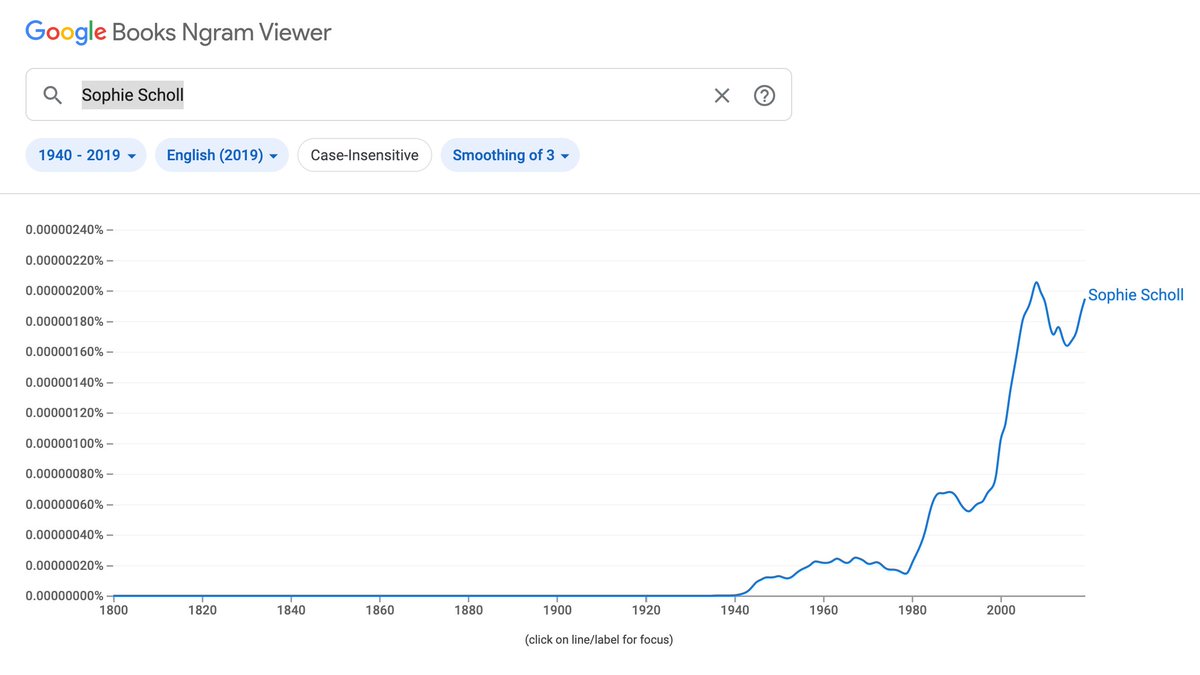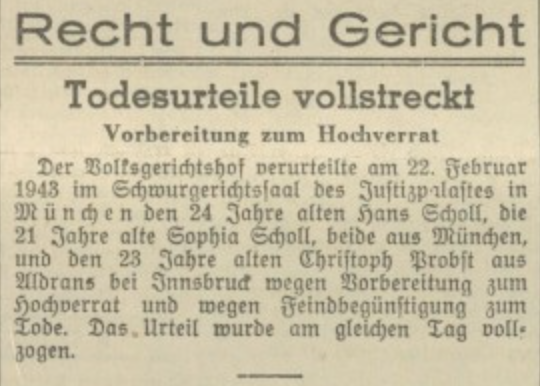On #SophieScholl& #39;s 100th birthday, a somewhat personal reflection on what she did, what it meant to me from an early age, and how history can and should be a personal journey as well.
I tread carefully here, and yet I may slip. Too many have made Sophie Scholl all about them.
I tread carefully here, and yet I may slip. Too many have made Sophie Scholl all about them.
She shouldn& #39;t be used for vague declarations of "resistance" against "the state" but should be seen in context as who she was: a person, a human being in her time and of her time. As someone who made specific brave choices when many did not, even though she knew the consequences.
I grew up in Ulm, Germany in the 1980s and 1990s.
The Scholl family was not only a memory then, but still an active presence.
(Some sources in the following only in German, sorry!)
The Scholl family was not only a memory then, but still an active presence.
(Some sources in the following only in German, sorry!)
Sophie Scholl& #39;s sister Inge had founded the Volkshochschule (Folk High School) Ulm, where I had English immersive classes meant for children. https://www.nytimes.com/1998/09/06/world/inge-aicher-scholl-81-a-german-whose-writing-inspired-pacifists.html">https://www.nytimes.com/1998/09/0...
Together with her husband, Otl Aicher, and Swiss architect and artist Max Bill, she co-founded the Ulm HfG; a spiritual successor to the Bauhaus.
https://web.archive.org/web/20061216080130if_/http://www.hfg-archiv.ulm.de/english/the_hfg_ulm/history.html">https://web.archive.org/web/20061...
https://web.archive.org/web/20061216080130if_/http://www.hfg-archiv.ulm.de/english/the_hfg_ulm/history.html">https://web.archive.org/web/20061...
The school had long become defunct when I was born, but I worked in its building, taken over by Ulm University, for a year after high school as part of my compulsory civil service.
These connections I vaguely knew about. That& #39;s why I felt grounded somehow in what had been before, without really knowing yet how to put my finger on how, or why.
In Ulm, the Scholl siblings were remembered on plaques and in the names of institutions and places. https://english.ulm.de/0/hans-and-sophie-scholl">https://english.ulm.de/0/hans-an...
I don& #39;t remember the first time I heard her – and her brother& #39;s – story. But I remember that it was then, very much, a local story.
Of people who had walked the same streets and knew some of the same places I knew, but still had a vivid connection to world historical events.
Of people who had walked the same streets and knew some of the same places I knew, but still had a vivid connection to world historical events.
I went to Munich and studied at LMU, the same university the Scholls had studied at. It too, remembered them modestly, locally. The square in front of the main building was named for them. There was a small documentation center.
Images of the famous leaflets against the Nazi regime that they had dropped in the atrium were embedded into the pavement. People stepped over them, but some also always stepped around them. And some read them.
I paused to read the snippets I could several times. And I never entered the building unaware of their presence.
As the anniversaries of various World-War II and Nazi-related events neared and passed, a modest boom in remembering her set in. More books talked about the Scholls. Their, to me, personal and – doubly – local story was becoming more of a national one.
Hans, and especially Sophie Scholl, were becoming globally famous names associated with Nazi resistance.
The biographies multiplied, the books that mentioned them became more numerous (for whatever that is worth, a Google Ngram search shows a significant uptick for "Sophie Scholl" after the turn of the century). https://books.google.com/ngrams/graph?content=Sophie+Scholl&year_start=1940&year_end=2019&corpus=26&smoothing=3">https://books.google.com/ngrams/gr...
Sophie Scholl was turning into an icon. She was turning into someone to put on a t-shirt. And there are many t-shirts now.
When I began my studies there twenty years ago, the University of Munich AStA (student government association) used an image of Sophie Scholl for their alternative university logo, along with the long-standing demand to rename LMU into "Geschwister-Scholl-Universität."
Remembrance is multifaceted, and there& #39;s often no one right way. Certainly there are worse icons to have.
But icons quickly become disconnected from real persons.
But icons quickly become disconnected from real persons.
Sophie Scholl, the human being who grew up in Nazi Germany, who enthusiastically joined the Hitler Youth& #39;s girls organization but slowly became disillusioned with the party& #39;s ideology was detached from her story, her history. https://twitter.com/Strack_C/status/1390907007796973570">https://twitter.com/Strack_C/...
The young woman who had grown up in my home town was no longer allowed to be a historical figure who had acted in her time and reacted to the world of her time.
She was made to be a speaker for ideologies, her resistance to the Nazis recently even co-opted by those protesting against wearing masks in the age of Covid. https://www.br.de/nachrichten/deutschland-welt/wie-die-querdenker-sophie-scholl-instrumentalisieren,SWj38Jc">https://www.br.de/nachricht...
This is where the present and history collide and where Sophie Scholl& #39;s brave acts of resistance against a murderous regime are appropriated in inappropriate ways, complete with a faked quotation:
Supposedly Scholl said "Der größte Schaden entsteht durch die schweigende Mehrheit, die sich fügt und alles mitmacht" – "The greatest damage is done by the silent majority who obey and let everything happen to them."
This has been debunked. https://faktencheck.afp.com/es-gibt-keine-belege-fuer-dieses-zitat-von-sophie-scholl">https://faktencheck.afp.com/es-gibt-k...
This has been debunked. https://faktencheck.afp.com/es-gibt-keine-belege-fuer-dieses-zitat-von-sophie-scholl">https://faktencheck.afp.com/es-gibt-k...
But aside from this, and above all, those who abuse Scholl for their own purposes commit an always reoccurring category error when historical figures are drafted to be speakers for the present:
That the historical person transported into the present wouldn& #39;t be the historical person, as she would be robbed of her context.
If they claim that "Sophie Scholl would have voted for the AfD" (among other ludicrous claims), they either fundamentally misunderstand or purposely misconstrue what it means for someone to be a historical figure.
The confuse various versions of Sophie Scholl and combine them into one that is helpful to them. The historical Sophie Scholl, the woman born one hundred years ago today who experienced the Nazis as they rose and as their regime became established, is dead.
She was executed in 1943 and "would" not have done anything in 2021.
If one imagines her doing something today, one must either imagine her transported at the time of her execution into the present context. https://anno.onb.ac.at/cgi-content/anno?apm=0&aid=szt&datum=19430224&seite=5">https://anno.onb.ac.at/cgi-conte...
If one imagines her doing something today, one must either imagine her transported at the time of her execution into the present context. https://anno.onb.ac.at/cgi-content/anno?apm=0&aid=szt&datum=19430224&seite=5">https://anno.onb.ac.at/cgi-conte...
She would be a person out of time, unaccustomed to our ways, and therefore someone with very little authority to say anything useful about the present.
Alternatively, one could imagine a person with the DNA and moral convictions of Sophie Scholl being born in the year 2000. It is safe to say that she, too, would not be the same person who actually lived, as she would have grown up in a very different world.
Or one must imagine her as having lived through the Nazi regime and up to the ripe old age of 100, with almost 80 years in between for her to grow, change, experience, and in essence become a very different person.
But she, too, "would" not have done anything. She would or wouldn& #39;t do things you could be sure about, and wouldn& #39;t simply be Sophie Scholl, the iconic martyr.
Icons are useful because they can inspire. But they are also always in danger of being abused. What we know about Sophie Scholl, we know about the historical person.
The icon is someone else.
The icon is someone else.
Sophie Scholl doesn& #39;t "belong" to one group or another. The historical Sophie Scholl fought the Nazi regime. She had convictions that mapped onto the world she lived in.
We can use her story to remember what the Nazis did, and we can let her inspire us to find our own convictions.
Does that, then, mean we cannot disclaim her use by the "Querdenker" and other right-wing or right-wing adjacent groups?
No.
No.
Because there are some things we can say with certainty:
Sophie Scholl fought against the Nazis. Among those who now use her image are people who revere Nazi ideology.
Sophie Scholl fought against the Nazis. Among those who now use her image are people who revere Nazi ideology.
To point out the absurdity in this is to use knowledge about the past in the present. https://www.thelocal.de/20210508/alarm-as-german-anti-maskers-co-opt-nazi-resister-sophie-scholl/">https://www.thelocal.de/20210508/...
So, let me make it abundantly clear:
If you& #39;re marching next to Nazis and Nazi sympathizers, Sophie Scholl is not yours to claim.
Everyone else I urge to learn about the person and not be content with just the icon.
If you& #39;re marching next to Nazis and Nazi sympathizers, Sophie Scholl is not yours to claim.
Everyone else I urge to learn about the person and not be content with just the icon.

 Read on Twitter
Read on Twitter



